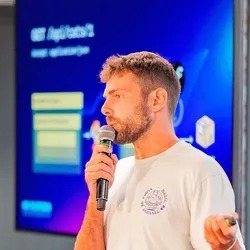
Conferences
All the Fork it! Conferences
Hanoi, Vietnam, 2026
Shaping Symfony 8, Shipping Symfony 8: Lessons from the Inside

Mathias Arlaud

Robin Chalas
Symfony 8 represents a major leap forward for the framework. As core team members, we’ve helped shape this evolution. As founders of baksla.sh, we’ve lived with the consequences of our architectural choices in production.
This dual perspective—framework development and real-world deployment—has taught us what truly matters when building enterprise applications with Symfony.
In this keynote, we’ll share the patterns and practices that have emerged from this unique position: contributing to the framework while simultaneously pushing it to its limits on business-critical projects.
With Symfony 8.0 and PHP 8.5 both freshly released, the landscape of modern PHP architecture is shifting. We’ll explore what’s now possible and how to make strategic decisions that compound in your favor as your applications grow and evolve.
Join us to discover where Symfony is taking enterprise software development with its latest major version.
Building an AI Company: Creating Real Value from Uncertain Technology

Wang Haokai
Large Language Models (LLMs) are transforming how we build software, but their real business value is still unclear to many teams. In this talk, I’ll share our experience building an AI company on top of this fast-evolving technology — including lessons learned, mistakes made, and what actually worked.
We’ll start by briefly demystifying AI, covering three major categories: statistical AI, generative media (image and video), and language models, with a focus on why LLMs represent a new paradigm for software development.
Next, we’ll explore how to identify meaningful opportunities when concrete use cases don’t yet exist. I’ll introduce practical frameworks we used to separate hype from real value and decide what problems are worth solving.
Finally, I’ll discuss how to communicate a vision that has no direct comparison. We will chat about storytelling techniques we used to help customers, and teammates understand abstract ideas and align around a shared future.
Modern stack for old books: Engineering a digital library for Southeast Asian history

Sylvain Dorey
Spreading knowledge and facts in the current era of post-truth, short-form content and deep fakes is more important than ever. History and archives help us deal with the flood of sloppy and misleading information. But working with real archives comes with specific difficulties: large volumes of data, useful information hidden in noise, poor scan quality, handwritten texts that are hard to read.
In this talk, I will explain how we try to solve these problems by using modern technologies while building GRAC LAI, a digital library focused on documents related to the history of Southeast Asia.
We will cover original ways of getting a high-level view of thousands of images, automatic metadata generation for text and images, recent progress in handwritten text recognition models, the use of GPUs in the cloud to speed up processing and the platform to publish and share these archives with the general public.
What Changes When Current Security Practices Meet the Blockchain

Quy Nguyen
Most software systems today are built with familiar security practices: trusted administrators, private infrastructure, controlled users, and the ability to fix problems after deployment.
Blockchain systems change many of these assumptions.
This talk shares real examples of what actually changes when current security practices are applied to blockchain-based systems, even when teams follow best practices and have experienced developers.
The first part of the talk is designed to be accessible to non-technical audiences. Through concrete stories from real projects, we’ll explore how ideas like trust, responsibility, ownership, and incident handling evolve when software becomes public, immutable, and permissionless — without diving into technical details.
In the second part, we’ll connect these ideas to real blockchain security incidents, showing how everyday decisions and processes led to unexpected failures once deployed on-chain, and what changes helped avoid repeating the same mistakes.
This is not a marketing talk and not a deep technical session. It’s an honest, experience-based look at how security needs to be rethought when familiar software practices meet a very different execution environment.
One dissatisfied customer led me to redesign web design!

Michel Boretti
As web development started in the late 90s, monitors:
- had a 4:3-ratio
- were less than 15-inch wide
INITIAL web design was designed to fit into these devices.
The advent of the smartphone forced the EXISTING INITIAL web design to become “responsive”; the “mobile first” approach was not a new design, but only a new process to achieve the responsiveness of the EXISTING INITIAL web design.
With the advent of large and even over-sized screen displays (large meeting room’s TV, 57-inch 32:9-ratio gamer curved monitors): nothing happened!
No evolution of the existing initial web design was made to fit into these large devices either. But could such an evolution be made? Or is a brand new web design long overdue?
The very simple answer to these questions came from a dissatisfied customer: yes, a brand new design has long been overdue!
The EXISTING INITIAL web design fits into smartphones and monitors with a 4:3-ratio: already on screens with a 16:9-ratio, people are already artificially limiting the width of the page to around 1,200 pixels. And this is exactly the solution provided by CSS libraries such as Tailwind or Bootstrap!
Have you already seen how such websites look like on screens with 21:9 and even 32:9-ratios?
And how would these websites look like in the future on hypothetical Quadri, Penta or HexaFold phones? Already on conventional folded fold phones in landscape orientation, for which the screen ratio is greater than 21:9, these websites have the same design issue.
Now, back to the dissatisfied customer; the word “dissatisfied” I am using about him is a little bit exaggerated: “disappointed” would be more accurate.
After working with him and his own customers on several projects, he entrusted me with the complete redesign of his own company website!
At that time, I was leading the company I had founded, and I had a graphic designer in my team: as a software developer with over 10 years experience in full-stack web development myself, I have the advantage that I can work hand in hand with a graphic designer, check that his/her design is technically implementable, and directly show the website in its demo version to the customer, instead of just a Figma concept.
And, the customer simply reacted: “Michel, what you did looks simply awful!”.
And, he took his phone, and he took a picture of his 57-inch 32:9-ratio gamer curved monitor on which the demo website was displayed, and he sent the picture to me!
And, only at this point I discovered that over-sized screen displays existed.
And, only at this point, I had become aware of exactly the problematic I am exposing in this present paper!
First observation: the “mobile first” approach led to the “one size fits all”, or rather the “one content fits all sizes” mentality. And this cannot be the answer anymore…
ONE answer, mine, is: for ONE range of screen ratios, there shall be ONE specific layout and content:
- screen ratio less than 1:1, ie any device in portrait orientation
- screen ratio greater than or equal to 1:1, but less than or equal to 21:9, ie any device in landscape orientation
- screen ratio greater than 21:9
And, here is the result: https://www.michel-boretti.com/
Second observation: I have been mentioning the different screen RATIOS, but the web development industry is still thinking in FIX SIZES! Including Bootstrap or Tailwind: mr-2, py-4, space-x-1,…
My answer is being made thinking in RATIOS.
More exactly: in RATIO (singular).
Which ONE? Which value?
This is exactly in the presentation I really hope to give on March 2026 in Hanoi!
Open infrastructure for AI era

Sang Tran Quoc
This presentation introduces Open Infrastructure for the AI Era, highlighting how open-source technologies—led by OpenStack and the OpenInfra ecosystem—are emerging as a foundational platform for next-generation AI and HPC workloads. Drawing insights from the first OpenInfra for AI Working Group white paper, the talk explores reference architectures, best practices, and real-world use cases that demonstrate how open infrastructure can power AI training, inference, GPU-as-a-Service, MLOps platforms, high-performance computing clusters, and AI at the edge.
The session also shares practical experience from FPT Smart Cloud, a Vietnam-based contributor to the global OpenInfra for AI community, including lessons learned from deploying large-scale AI Factory clusters ranked in the Top 500 AI infrastructures worldwide. Key topics include GPU integration strategies (PCI passthrough, vGPU, MIG), high-performance storage and networking (RDMA, InfiniBand, SR-IOV), and system-level optimizations that unlock maximum performance from the same hardware.
By the end of this presentation, attendees will gain a clear understanding of why open, community-driven infrastructure is becoming a strategic enabler for AI innovation—reducing vendor lock-in, accelerating time to market, and creating new opportunities for global collaboration and “Make in Vietnam” AI platforms in the global AI economy.
From Vibe Coding to Vibe Learning

Cédric Dué
AI-powered coding tools have dramatically changed the way we write software. Today, generating large amounts of code is as simple as describing what we want. While Vibe Coding can boost short-term productivity, it also introduces a serious risk: writing and deploying code we do not truly understand — a growing concern for many companies.
AI is a game-changer, and developers must adapt. However, embracing AI does not mean giving up understanding. On the contrary, it offers an opportunity to learn differently and potentially faster.
In this talk, we explore how AI can become a learning partner rather than a blind code generator. We will discuss how developers can utilize AI to gain a deeper understanding of algorithms, language-specific nuances, performance trade-offs, and design decisions. By asking the right questions, code generation becomes a powerful learning tool.
By shifting from Vibe Coding to Vibe Learning, developers can regain control over their codebases, enhance their skills, and build more robust and maintainable software.
The AI Career Lift: Leveraging Today's AI to Stay Relevant and Outperform

Ba Ngoc
AI is no longer a future trend — it’s a present-day career multiplier. This talk explores the current stage of AI, what it can realistically do today, and how professionals can leverage it to boost productivity, expand skill sets, and stay competitive. Attendees will leave with practical insights and actionable ways to elevate their careers in the AI era.
Rouen, France, 2026
OpenStreetMap Live Editing Workshop

Patrick Kasperczyk

Matthieu Bessat

Hugo Kwiatkowski
Bangkok, Thailand, 2025
Deploy Anything with AI: From Elixir to Rust to Edge Functions

Erwan Rougeux
What if AI could become your DevOps pair? In this session, we’ll show how to build an AI-assisted deployment pipeline that understands your code whether you’re deploying a Phoenix app in Elixir, a Rust backend, or a serverless workload. Using LLMs, open-source agents, and CI/CD integrations, we’ll explore how to auto-generate Dockerfiles, Kubernetes manifests, reverse proxy configs, and even sanity tests. This talk is about practical AI tooling for real-world deployments, not just GitHub Copilot magic.
CORPORATE SECURITY : leverage OSINT, corporate intelligence, cyber resilience for proactive governance

Matt L.
As digital transformation accelerates, organizations must evolve from reactive risk management to intelligence-driven foresight. This forward-looking conference explores how OSINT methodologies, advanced cyber practices, and organizational OPSEC can be integrated into security and compliance functions to anticipate threats before they materialize.
In addition to strengthening resilience, special emphasis will be placed on the protection of critical corporate assets including intellectual property, strategic data, and C-level security against increasingly sophisticated cyber, human, and regulatory threats.
This conference delves into the critical intersection of cyber, human, and compliance risks, highlighting how corporate intelligence acts as a strategic enabler to minimize uncertainty and drive informed decision-making. It explores the essential shift from reactive risk management to proactive, intelligence-driven governance, relying on rigorous cultural foundations and companies transformation.
Kuala Lumpur, Malaysia, 2025
Homelab Renaissance: 21 Stacks, 200 Services, Full Autonomy

Erwan Rougeux
Tired of SaaS lock-in and cloud costs? This talk is a roadmap to reclaiming your digital sovereignty.
We’ll walk through a real-world homelab running over 200 services: from self-hosted AI models to container orchestration, monitoring, backups, and remote access — all on commodity hardware. Whether you’re into Nix, Docker Swarm, or bare metal, this is an honest account of the joys and challenges of running your own infrastructure.
Bonus: tips to keep it energy-efficient and spouse-approved.
Designing from the Margins: Building UX Culture Across Borders

Souhir Mkaouar
Coming from Tunisia, a country where UX is still developing, I’ve spent the last few years designing digital products while also educating clients, collaborators, and even users about the value of UX.
As a freelance designer and founder, I’ve worked with both local and international clients, often across vastly different cultural, linguistic, and organizational landscapes. This talk shares how I built UX culture from the ground up, and what it taught me about empathy, flexibility, and communication.
In this session, I’ll cover:
- How I introduced UX practices in environments unfamiliar with user-centered design
- What it means to work with international clients when communication styles and expectations differ
- Strategies I developed to adapt to cultural constraints while preserving UX quality
- Lessons learned from building trust, alignment, and clarity with clients from different parts of the world
This talk is not just about design, it’s about resilience, cultural intelligence, and shaping impact from outside the mainstream UX hubs.
Advanced Unit Testing For Web Accessibility

Raihan Nismara
Advanced unit testing for web accessibility empowers developers to build inclusive digital experiences from the ground up. By integrating accessibility testing into unit testing workflows, developers can identify and address accessibility issues early, fostering a more accessible web for all users.
Giving Pixels a Pulse: A Guide to Audio-Reactive Shaders

Mohamed Rejeb
What if pixels could listen? In this talk, we’ll explore the world of shaders through audio. Starting from the basics of fragment shaders, we’ll learn how to bring visuals to life by making them react to sound. Like the glowing, pulsing animations you see in voice assistants such as Siri or Alexa. Step by step, we’ll go from simple waveforms to dynamic animations that move with your voice or music. By the end, you’ll understand how to turn raw audio input into real-time shader magic and leave with practical techniques to create your own sound-responsive visuals.
Creating engaging animations with React Native

Omar Borji
React Native now allows for easily creating fluid and elegant animations, improving the user experience and making applications more attractive. In this conference, we will explore several types of animations simple to develop and integrate into your projects
Unleashing Gemini superpower with Chrome Extension

Vin Lim
Explore the incredible potential in the combination of Gemini and Chrome extensions. Chrome Extensions can help you create tailored web experiences, including for video and audio. With Gemini’s powerful multimodal APIs, you can build completely new experiences.
Designing with LLMs: Rethinking code, functionality, and user interfaces

Sylvain Dorey
Large Language Models (LLMs) are infiltrating software systems in transformative ways: not only do they write code, but they are replacing traditionally deterministic functions with probabilistic behavior. Additionally, they are integrated into the user interface alongside conventional UI components.
This talk will explore the architectural and UX implications of this shift. What happens when part of your logic becomes unpredictable? When should an LLM replace traditional logic, and when should it augment it? How can we design user interfaces that give users control, visibility, and confidence when interacting with such systems?
Based on real-world integrations and emerging design patterns, we will outline actionable principles for:
- Structuring LLM components within a codebase
- Designing interfaces that support recoverability, transparency, and and alignment with user goals
This talk aims to provide both developers and designers with a framework to integrate LLMs effectively, opening the debate about the trade-offs involved in bringing generative models into modern software.
Building a Web3 Startup in Malaysia

Eason Chai
This talk explores the journey of launching a Web3 startup in Malaysia, delving into the unique opportunities and challenges within the region’s evolving digital landscape. We will cover the essentials of Web3 technologies such as blockchain, DeFi, NFTs, communities and how they can be leveraged to create innovative startups.
I’ll share my personal story of diving into the wild world of Web3 startups right here in Malaysia as well as my experiences tackling Malaysia’s regulatory scene, figuring out go-to-market plans, and dealing with challenges like finding the right talent and infrastructure.
From Zero to Live: Is it possible to ship an app in 45 minutes?

Hugo Pérard
The goal of this talk is to showcase the real-world advantages of using a modern project starter like Start-UI to rapidly build and deploy a full-stack web application. By starting from scratch and going live during the session, we’ll demonstrate how much time and complexity a well-designed starter can save — from architecture and authentication to styling and developer experience. To make it even more fun and practical, the final app will include a live interactive feature that lets the audience engage with it.
🧭 Talk Outline
- Introduction Who you are & what the session is about Why using a project starter can save a lot of time Quick overview of Start-UI
- Project Initialization Creating the app using CLI Setting up project and deployment stuff First deployment to Vercel
- Building the Interactive Feature Introducing our app feature Live coding the key parts: API routes Frontend Sharing the app link or QR code with the audience
- Production Deployment Push feature to production Check that everything works
- Live Audience Interaction Invite attendees to submit messages Live display on stage
- Conclusion & Q/A Recap: Time from zero to live + key advantages of using a project starter Pros/cons of this approach in real-world projects Open the floor for questions
React Native UI and style made easy and fast with Ficus UI

Nicolas Torion
Creating and styling user interfaces in React Native has always been a challenge. Out of the box, React Native provides only basic components and a less-than-intuitive styling solution via StyleSheet. Over the years, the developer community has stepped up with libraries like React Native UI Kitten, Material UI, NativeBase, Magnus UI, and React Native Paper, making UI development more approachable. However, these libraries often come with strong design opinions—such as enforcing Material Design—which can make building highly customized UIs a complex task.
In 2024, a new wave of UI libraries emerged, offering compatibility with both mobile and web through tools like react-native-web. Yet, at BearStudio, we felt there was still a gap. We longed for a React Native equivalent of Chakra UI—a React web library we love for building web UIs. We also believe that truly exceptional user experiences require components optimized specifically for mobile, rather than one-size-fits-all solutions.
That’s why we developed Ficus UI, an open-source library inspired by Chakra UI and forked from Magnus UI. It brings the most popular Chakra UI components to React Native, maintaining a consistent API while focusing on simplicity, flexibility, and native-like user experiences.
In this talk, I’ll compare the existing UI libraries for React Native, share the journey of creating Ficus UI, and demonstrate its strengths through a live demo. Whether you’re a mobile developer or just exploring React Native, discover how Ficus UI can transform your approach to building UIs with speed and ease ⚡️
Rebooting Engineering: From Ticket Takers to Business Builders

Hugo Siow

Kelvin Lai
When people invite me to share, they usually expect me to talk about property deals or market trends. That’s where I spend most of my time. But this time, I want to take you behind the scenes of something different — my journey of building a CRM and property listing management website.
I started this project not because I was a tech founder, but because I was frustrated. Every day I saw agents, including myself, chasing after every lead, every call, every “maybe client.” We were running in circles, busy from morning till night, but results were unstable. The more we chased, the more drained we became.
So I asked myself: Is there a smarter way?
Building this system became my way of answering that question. Along the journey, I discovered something that completely shifted my mindset: you don’t need everyone. You only need to focus on the 1% who really matter.
In this talk, I’ll share how this realization came to me step by step:
The early mistakes I made by trying to build for “everyone.”
The turning point when I saw clearly who my real clients were.
How focusing on that 1% changed not just my project, but also my approach to business and life.
This is not just about a CRM system or some property tech tool. It’s about learning to stop spreading yourself thin, and start building deeper, stronger relationships with the right people.
If you’re someone who has been running non-stop, trying to keep up with everyone and everything — my journey might sound familiar. I’m here to tell you: there’s another way. By focusing on your 1% clients, you can reduce stress, grow faster, and actually enjoy the work again.
At the end of this sharing, I hope you don’t just walk away with a new idea about CRM or property listings, but with a mindset that helps you win the market without losing yourself.
Bangkok, Thailand, 2025
Rebooting Engineering: From Ticket Takers to Business Builders

Erez David Shtayman
As startups scale, something dangerous often happens: engineering teams that were once deeply connected to the product and business start drifting into execution mode. They ship features, close tickets but lose sight of the “why.”
In this talk, we’ll explore the subtle but critical shift from tight, business-aware teams to siloed R&D organizations where engineers operate without context. We’ll unpack the real-world consequences: slower delivery, misaligned roadmaps, and a growing gap between what’s built and what the business needs.
Most importantly, we’ll talk about how to fix it.
Drawing from both startup and scale-up experience, we’ll cover concrete ways to maintain product and business awareness as your team grows. From storytelling rituals to architecture choices, you’ll leave with principles and practices that help reboot engineering culture so your teams can think like owners, not just executors.
“For anyone who wants to grow their engineering team without losing its soul.”
First big project? Keep calm, adapt and learn

Marie Douet
You thought you’d feel quickly comfortable in your first dev job… but what happens when the project is huge and already halfway done?
In this talk, I’ll share what it’s like to join a big ongoing project for the first time, and how to work through it when everything feels out of control. From handling legacy code to managing your imposter syndrome, this talk focuses on real difficulties we all face and tips to overcome them.
You’ll hear honest feedback on how to adapt quickly and find your place in a complex team environment. There are no easy answers or miracles, just lessons learned the hard way, and some good news: you’re not alone.